An Uncertain Glory
India and its Contradictions

Editorial Allen Lane
Fecha de edición julio 2013 · Edición nº 1
Idioma inglés
EAN 9781846147616
448 páginas
Libro
encuadernado en tapa dura
Resumen del libro
Two of India's leading economists argue that, despite economic development, there must be a greater understanding of inequalities in India. When India became independent in 1947 after two centuries of colonial subjugation, it immediately - and quite successfully - adopted a firmly democratic political system, with multiple parties, freedom of speech and extensive political rights. The famines that had been so common in colonial days disappeared, and steady economic growth replaced the almost complete stagnation characteristic of the long rule of the Raj.
The growth of the Indian economy, which quickened over the last three decades, became the second fastest in the world. Despite a recent dip, it is still one of the highest among nations. Maintaining rapid as well as environmentally sustainable growth remains an important and achievable goal for India.
In An Uncertain Glory, two of India's leading economists argue that the country's main problems lie elsewhere, particularly in the lack of attention paid to the essential needs of the people, especially the poor. The deep inequalities in Indian society tend to constrict public discussion in India's vibrant media to the lives and concerns of the relatively affluent. One of the biggest failures has been the very inadequate use of the public resources generated by economic growth to expand India's lagging physical and social infrastructure (in sharp contrast, for example, to what China has done): there is a continued inadequacy both of social services such as schooling, medical care and immunization, and of physical services such as the provision of safe water, electricity, drainage and sanitation.
Even as India has overtaken a large number of other countries in the rate of economic growth, it has, because of these inadequacies, fallen behind many of the same countries - often very poor ones - in the progress of quality of life. Because of the importance of democracy in India, addressing these failures will require not only significant policy rethinking by the government, but also a better public understanding of the abysmal extent of these social and economic deprivations. This book makes a powerful contribution to that understanding.
Jean Dreze has lived in India since 1979 and became an Indian citizen in 2002. He has taught at the London School of Economics and the Delhi School of Economics, and is now Visiting Professor at Allahabad University. He is co-author (with Amartya Sen) of Hunger and Public Action and India: Development and Participation, and one of the co-authors of the Public Report on Basic Education in India.
Amartya Sen is Lamont University Professor, Professor of Philosophy and Professor of Economics, at Harvard University. He won the Nobel Prize in Economics in 1998 and was Master of Trinity College, Cambridge, 1998-2004. His many books include Development as Freedom, Rationality and Freedom, The Argumentative Indian, Identity and Violence and The Idea of Justice.
Biografía del autor
Economista y filósofo, Amartya Sen (India, 1933) es una figura clave en el pensamiento económico actual. Sus investigaciones y trabajos se han centrado fundamentalmente en dar voz a los más desfavorecidos y en definir la teoría de la elección social, el bienestar económico y el desarrollo humano. <br> En 1998 recibió el Premio Nobel de Economía y se le acaba de conceder el premio Princesa de Asturias de Ciencias Sociales 2021.<br> Su escuela de pensamiento sobre los mecanismos que se esconden detrás de la pobreza ha contribuido a promover la lucha contra la injusticia, la desigualdad, la enfermedad y la ignorancia , tal y como ha destacado el jurado del premio.








